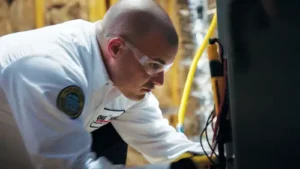 Prevent Furnace Troubles Here’s What You Need to Know Before You Freeze!
Prevent Furnace Troubles Here’s What You Need to Know Before You Freeze!
It’s a freezing cold night, you’re bundled up on the couch, and suddenly nothing. No warm air, no comfort, just a cold that seems to seep into your bones. Your furnace has decided to take an unexpected vacation, leaving you shivering and frustrated. Sound familiar? Don’t worry, you’re not alone.
As someone who’s been through the panic of a malfunctioning furnace (and learned the hard way), I’m here to break down the most common reasons your home’s heating system might be giving you the cold shoulder, and what you can do to prevent your Furnace from breaking down when you need it most.
The Thermostat: Your Furnace’s Communication Center
Let’s start with the most basic often overlooked culprit, your thermostat. Think of it like the command center for your home’s warmth. Sometimes, the issue is super simple:
- Did you accidentally set it to “cool” instead of “heat”? Oops!
- Are the batteries dead? (Pro tip: Always keep spare batteries handy)
- Are there any loose wires playing hide and seek?
If you’ve checked these and things still aren’t working, you might be looking at a thermostat that needs professional attention or replacement.
The Dirty Little Secret: Clogged Air Filters
Here’s something most people don’t want to talk about air filters. They’re like the unsung heroes of your heating system, and when they get clogged, your furnace throws a tantrum.
Imagine trying to breathe through a thick scarf. That’s what your furnace feels like with a dirty filter. Uneven heating, weak airflow? Yep, that’s probably your filter begging for help. The fix is simple: replace it every 1-3 months. If you’ve got pets or live in a dusty area, you might need to do it even more frequently.
 The Flame Game: Pilot Light and Ignition Woes
The Flame Game: Pilot Light and Ignition Woes
For those with older gas furnaces, the pilot light can be a real drama queen. It might go out randomly, leaving you in the cold. Newer electronic ignition systems aren’t immune to drama either.
With older furnaces, you might need to relight the pilot light (carefully, please!). For newer models, ignition problems often require a professional touch. Either way, don’t ignore these issues—they’re usually a sign of something bigger brewing.
When the Blower Motor Goes Silent
The blower motor is like the heart of your furnace it pushes warm air through your home. When it starts making weird noises like squealing or grinding, or if the airflow feels weak, you’ve got trouble.
This isn’t usually a DIY fix. A professional can determine if it’s the motor itself or just a failed capacitor. Either way, it’s not something you want to mess around with. Scheduling regular maintenance can prevent these issues before it becomes an emergency.
Blocked Vents: The Sneaky Furnace Killer
Here’s something super simple that people often overlook. Blocked vents can cause your furnace to overheat and shut down. Do a quick check:
- Are all your vents open?
- Is furniture blocking airflow?
- Are the vents dusty?
A little cleaning and rearranging can make a big difference.
Sensors: The Safety Patrol of Your Furnace
Furnaces have multiple safety sensors to prevent potential disasters. The flame sensor, in particular, can be a bit sensitive. If it gets dirty, it might shut down your furnace faster than you can say “I’m cold!” The best way to prevent this from happening is scheduling regular maintenance.
 Power Problems: It Might Not Be the Furnace
Power Problems: It Might Not Be the Furnace
Sometimes, the issue isn’t your furnace at all. Check your circuit breaker. Has the power switch been accidentally flipped? These simple checks can save you an unnecessary service call.
The Aging Furnace Dilemma
Let’s be real furnaces don’t last forever. Most have a lifespan of about 15-20 years. If yours is getting up there in age and repairs are becoming frequent, it might be time to consider a replacement. If repair costs are approaching the price of a new unit, it’s probably time to upgrade. Newer models are more energy-efficient and can save you money in the long run.
The Magic of Maintenance
Here’s the golden rule of furnace ownership, preventive maintenance is your best friend. An annual professional inspection can catch small issues before they become expensive nightmares.
Your Emergency Furnace Survival Kit: Be Prepared!
While we’ve covered the main reasons your furnace might fail, it pays to be prepared for those moments when things go wrong. Put together a small emergency kit to help you weather unexpected heating issues:
- Keep extra blankets easily accessible
- Have a few space heaters on hand (and check their condition annually)
- Keep a flashlight and extra batteries near your furnace area
- Have the contact info for a reliable HVAC technician saved in your phone
A little preparation can make a huge difference when your furnace decides to take an unexpected break. By staying proactive and having a backup plan, you’ll ensure that even if your heating system throws a curveball, you and your family will stay warm and comfortable.
When to Call the Professionals
Look, I get it. We all want to be DIY heroes. But some furnace issues are best left to the experts. If you’re experiencing persistent problems, or strange noises, or just don’t feel confident diagnosing the issue, call an HVAC professional.
Remember, a little proactive maintenance can save you from those bone-chilling nights of furnace failure. Stay warm, stay prepared, and don’t let a temperamental furnace catch you off guard!
